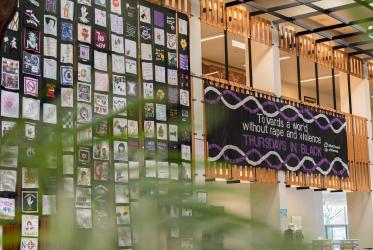In January 2019, Aya Maasarwe, a university exchange student in Melbourne, was walking home at night and speaking to her sister on her phone. She was attacked, raped and murdered.
The public outcry intensified a national debate about violence against women in Australia following several high-profile murders in the country.
A recent report found that one out of every two women in Australia don’t feel safe walking alone at night, the highest rate of any Organization for Economic Cooperation and Development country. Yet Australian men’s perception of safety was higher than anywhere else in the same group of countries. This discrepancy in men’s and women’s perceptions of risk point to deeper issues in women’s experience of violence particularly from intimate partners.
“Domestic and family violence is a conversation in Australia that has gathered a lot more momentum – not for really good reasons,” says Emily Evans, project officer for the National Council of Churches in Australia. “News of women just walking on the street on their way home who were murdered has not only highlighted women’s safety but also attitudes towards women. Added to that, women are more likely to be victims in their own homes.”
An earlier study in Australia found that violence by intimate partners is the greatest health risk factor to women aged 25-44.
Churches address violence
Recognizing that a number of churches around the country were working to address domestic and family violence in different ways, the National Council of Churches in Australia organised a roundtable in Melbourne on 2 May.
The main aim, said Evans, was to provide a space for sharing and networking.
“Having them in the same room meant they were able to share what they were doing. And for others who weren’t at the same point as some churches, to hear how things were going and build upon the resources they have,” said Evans.
Helen Lockwood, Lutheran Church of Australia, affirmed that it is “very important to work ecumenically and not reinvent training and resources.”
The conversations at the roundtable covered the opportunities and challenges churches have to address sexual and gender-based violence. From issues of silence and denial, misuse of scripture, and perpetuating inequality, participants also highlighted opportunities to strengthen positive and respectful relations, modelling equality and building awareness and response to domestic and family violence.
As Evans said, the conversations moved from, “how do we respond to violence,” to “how can we prevent violence from starting.”
Building the grassroots
Participants also discussed how the Thursdays in Black campaign could help their efforts. Its strengths were seen as easy to engage at an individual and grassroots level and can help to raise the profile of the issues. What would strengthen it further, they observed, is promoting it alongside the social service organizations of the churches who do the work on the ground.
In June, the National Council of Churches in Australia will hold its national forum and delegates will set strategic priorities for the coming years. Evans acknowledged that there is a lot of momentum now to address the issue of domestic and family violence, but finding resources to back action is vital.
For now, though, important progress has been made in sharing resources and connecting initiatives. As Janette Phelan, from Churches of Christ in Australia said, the meeting was “a privileged opportunity to meet and share ideas and resources with other churches, so that together we can achieve more.”








